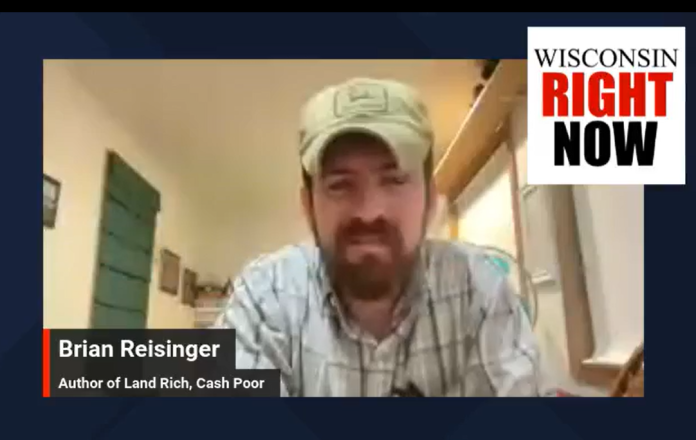The following excerpt is from Wisconsin author Brian Reisinger’s “Land Rich, Cash Poor:
My Family’s Hope and the Untold History of the Disappearing American Farmer.”
Reisinger’s book weaves hidden history from the Great Depression to today with the four-
generation fight for survival of his own family on their farm in southern Wisconsin, revealing risks to the cost and health of our food, America’s security from foreign adversaries, and more. This excerpt from Chapter 7 has been edited for length and clarity.
My first memory with my dad was in our barn —a barn still standing to this day. I was three years old, sitting on a pile of shelled corn in a wheelbarrow my dad was pushing back and forth across the manger in front of our family’s milk cows. Light shone from the long overhead lights, and the heat of animals filled the barn, so that everything was golden and warm, the cows maternal and hungry before milking. With the girls mooing and the wheelbarrow squeaking, we rolled from one cow to the next, feeding each of them by hand.
My dad was tanned on the arms and neck, and strong. He thought nothing of hauling wheelbarrows full of corn up and down the length of the barn, the added weight of his little boy along for the job. At each cow he plunged his large metal scoop into the pile and dumped her share of corn out into the manger. I did the same with a little plastic scoop, dipping into a pale of mineral that sat with me in the wheelbarrow.
Sprinkling each cow her ration of nutrients like pixie dust from Neverland. Every so often, my dad’s scoops would dig enough corn out from beneath me that it would give way, like the sands of time, and I’d tumble—one way or the other—as he worked the wheelbarrow handles just so, to balance the load and keep us rolling.
This is where we learned about the world. Me, and my sister, too, after she came along. Working with our dad, in whatever way our little hands could muster, in the barn and farmyard. Laughing as he hung us from the barn beams by our pants. Screaming as he squirted us with milk from a cow’s udder. Begging him, as he tried to get his work done, to tie us up with baler twine just one more time, to show him how we could escape no matter how tight he pretended to bind us. Watching as he and my mom did chores and tested milk quality and talked about crops together.
Drinking whole milk from a pitcher my mom dipped straight from the bulk tank in the milkhouse then carried to our kitchen table where breakfast was waiting for us all to eat together. Coming back to the barn at the oddest of hours to help pull a calf if its mother was struggling in labor, feeling it slide to the ground, my dad clearing its mouth and nostrils and watching, waiting to see if it would take its first breath—or fall lifeless.
“Come on gol’ dang you,” he’d say. “Come on now.”
We learned, too, in the fields beyond the farmyard where my dad would drive his old pickup, down through the valley, up onto sunny slopes where he had mowed rows of hay to make. Reaching down, he’d feel the fallen alfalfa with his hands, then look at the sky, deciding when it would be dry enough for him to come back through with the tractor to bale or chop his latest crop.
Work and weather and life and death. We learned each of these lessons, there in the dreams and safety of childhood, and each was destined to slip not only into the realities of adulthood, as all things do, but also into the peril of a vanishing way of life. This would be true no matter how badly we might wish it weren’t so, and laid bare with harsh honesty as my sister and I took our different paths. Paths that began in a Neverland that would one day depart from its natural law and disappear before our eyes.
***
American farm country in the late 1980s and 1990s was a dreamworld, an imaginary land in so many ways, not simply because of the innocence of childhood. And not because the fruits of a strong and relatively stable economy were not real, because they were. Farm life during this time was a dreamworld because it felt like a respite from the tumultuous decades that came before. Yet, for the hard-working families of the heartland that helped feed our country for centuries, it was a time of great danger and, for many, unseen extinction.
As the economy of a modern America and global trade system grew, farms already battered by decades of decline lost more control over their own destinies than ever before. Even as they recovered from past crises, they also slipped, one by one, into the endless pull of getting bigger or falling by the wayside. A world of increasingly large farms producing most of our food, or increasingly small farms requiring jobs off the farm to make it, emerged. The farms in the middle, like our family’s—once a major driver of our food economy and a hallmark of American identity—made up the largest share of the disappearance.
“What we end up seeing is kind of a dual system of agriculture,” said Paul Lasley, a rural sociologist and professor emeritus at Iowa State University. That system was one with ever-larger farms producing most of the food, he said, and small farms that families couldn’t depend upon for their entire living because the profits were too small, if they existed at all. Left in between was a hidden force that almost everyone who has closely studied it describes as a “hollowing out of the middle.”
And this slipping away, of large and small farms further away from one another, and of midsized farms out of existence, happened as most Americans—including many recovering farmers—experienced a new wave of opportunity. The tradeoffs facing American agriculture, that constant pairing of opportunity and peril farm families had known from the beginning, were in some ways more closely linked than they’d ever been. Free trade opened more markets across the world to American farmers, while introducing new and often unforeseen risks. A more sophisticated food supply chain accomplished more than ever for the American consumer but demanded more than ever for farm families to adapt.
All this happened as the American farmer carried the scars now of seven decades of disappearance: the loss of mixed agriculture that enabled the shift from subsistence farming; the two decades of off and on economic depression so much deeper than many knew; the departure of farm kids, so important to farming’s future, to the good jobs and bright lights of urban life; times of broad prosperity after World War II that left an unbelievable number of farms behind; family farms’ very own economic catastrophe during the Farm Crisis of the 1980s; and the change in technology that would continue to handicap small and midsized farms, no matter how competitive they were capable of being, for decades more. Now these forces compounded atop one another.
The disappearance was also more invisible than ever before. …
Brian Reisinger is an award-winning writer and rural policy expert who grew working with his dad from the time he could walk on their family farm in southern Wisconsin. His book “Land Rich, Cash Poor” was published August 20 and is available via Amazon and other online retailers, and at bookstores nationwide. He lives with his wife and daughter, and helps lead Wisconsin-based Platform Communications, splitting time between northern California near his wife’s family and the family farm in Wisconsin. You can find him on X at
@BrianJReisinger




















